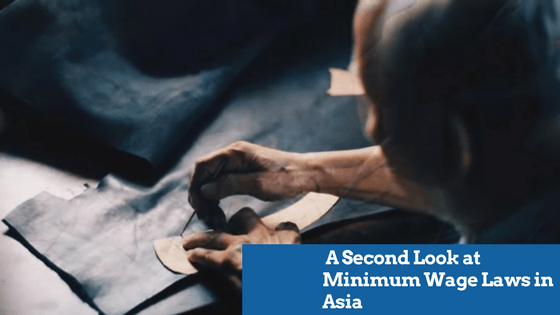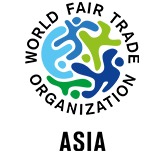
Asia is home to countries with the fastest growing economies, making it the most rapidly developing region in the world. According to a study by the World Bank, countries in the region with the biggest gains contribute their share in the economy through investments and exports which accelerate industrial growth. Despite the growth of wealth in the region, a substantial problem remains in these emerging economies: cost of living far exceeds the minimum wage.
Minimum Wage Laws
Minimum wage laws have been implemented in most countries throughout Asia, with the goal of ensuring that workers receive at least a minimum level of wage protection. All 18 countries in which WFTO members in Asia operate in have minimum wage laws implemented. But with the diversity of the Asian region, minimum wages in each country differ in their definition, exacerbating the challenge of agreeing on a fair wage for workers.
The following are examples from Wage Indicator of minimum wage laws in five countries:
Bangladesh
A specific labor act called the Bangladesh Labour (Amendment) Act 2013 gives a Minimum Wage board the responsibility for governing and deciding minimum wage rates. The government sets the minimum wage rate based on different industries and living wages, so more than one minimum wage exists in the country.
Cambodia
The Labor Code of 1997 regulates all labor laws. The minimum wage in Cambodia is only set for the garment and shoe-making industry based on occupational level for regular and probationary workers and apprentices. Workers in other sectors are based on the sympathy of the respective employer
Indonesia
Indonesia has separate legislation for fixing a minimum wage. Currently, minimum wages are set at a provincial level and may be further set at sectoral levels by Governors through Wage Councils and District Wage Councils. Minimum wage rates are fixed by taking into account cost of living and needs of workers and families. More than one minimum wage exists in the country.
Sri Lanka
The Wage Boards Ordinance regulates minimum wages in Sri Lanka. The Minister may establish a Wage Board for any trade, or any function or process in such trade. The main factors considered in the adjustment of minimum wage are changes in cost of living, wage demands of workers, and the type of contract of the workers concerned. More than one minimum wage exists in the country.
Vietnam
Vietnam has no separate minimum wage legislation; the general Labor Code 1994 (amended in 2013) regulates minimum wage fixing. The government determines a general minimum wage rate as well as rates for each region and, in principle, for each industry. Different minimum wage exist for different types of enterprises, ie. domestic and foreign-owned (FIEs).More than one minimum wage exists in the country.
Shared Characteristics
Through a Wage Indicator Foundation study, these five countries were found to be significant contributors to the Asian economy through garment production. But despite the fact that these countries have implemented minimum wage laws, they share similar characteristics in their implementation of a minimum wage:
• The minimum wage is not enough to cover the nutritional needs of a typical family.
• The minimum wage is not enough to exit from poverty nor provide for expenses beyond mere subsistence for a typical family.
• The minimum wages in the garment sector are lower than wages in other sectors.
• Workers have to work overtime in order to reach the minimum wage level.
• Minimum wage levels are significantly lower than the living wages.
Despite the recent increases of minimum wage in Asian countries in response to activism and the ethical fashion movement, it is clear from the study that their minimum wages countries STILL fail to fairly compensate the work of the producers. It is crucial that living wages should be ensured in order to provide workers with enough to cover their basic needs for the life that they deserve.
More than the minimum
At the heart of the Fair Trade Movement is a dedication to ensuring that workers and producers are compensated fairly in order to meet their basic needs and to thrive. In fact this dedication is outlined in the 10 Principles of Fair Trade. The Fair Prices, Fair Wages (FPFW) Working Group is working to strengthen the existing Fair Prices within the WFTO structure. The group has been investigating the best way to move forward with the issue of Living Wages. The FAIR PAYMENT POLICY & PROCESS will be presented and voted on at WFTO’s Annual General Meeting in Delhi in November this year.
In a world where an increasing amount of people are demanding more transparency and responsibility from corporations, it is not just governments that we should demand changes from, but also businesses and employers. It is also important for citizens to be informed of Fair Wages and the importance of Living Wage in order for us all to move forward towards a world without poverty.
By Jona Mojados, Summer’17 Communication Intern, WFTO Asia
